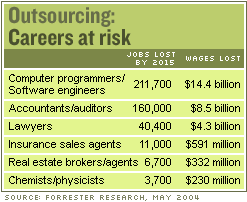NEW YORK (CNN/Money) -
Contrary to popular perception, Shakespeare didn't really suggest that killing all the lawyers might be a good thing. But that hasn't stopped some people from wishing they would just go away.
And now they are -- attorneys are the latest to see their jobs outsourced.
A number of U.S. companies, including members of the Fortune 500 and some of the country's largest law firms, are now embracing the idea of outsourcing routine legal work to India, South Korea, Australia and other locales with far lower labor costs.
General Electric (Research), the country's fifth-largest corporation, has taken the idea the farthest of any company and set up a subsidiary in India that employs about 30 lawyers.
Smelling opportunity, a handful of companies have sprung up in recent years, both in the U.S. and abroad, that sell outsourced legal services.
One of them, a Chicago-based outfit called Mindcrest sells services like document management and research that feed at the bottom of the legal profession's food chain. With rates ranging from $20 an hour at the low end to $70 an hour at the top, the savings can run as high as 70 percent for work traditionally handled by junior U.S. lawyers who command close to $200 an hour.
"(The U.S. demand for legal work outsourced abroad) hasn't exploded yet," said George Herreran III, Mindcrest's general counsel and a former partner in one of the country's largest law firms. But, he noted that Mindcrest's business has doubled every year since it was founded in 2001. "Our business has been on a significant growth spurt."
Herreran said that Mindcrest plans to double, to just under 40, its number of India-trained lawyers located in Mumbai by year end.
A protectionist profession
Like outsourcing generally, shifting lawyer jobs overseas is still a relatively small phenomenon. The U.S. legal industry, according to government data, is a $184 billion behemoth with roughly a million trained attorneys and about 500,000 support personnel such as paralegals and legal assistants.

This year 12,000 legal jobs moved offshore -- less than one percent of the total -- according to Forrester Research, a Cambridge, Mass.-based market research firm. By 2015, Forrester predicts the job losses will increase to 79,000, with just over half being attorney positions.
One immutable obstacle: the guild-like nature of the U.S. legal profession. Government regulations mandate that only lawyers who are licensed in the U.S. can give legal advice on American law. That effectively means India-trained lawyers who are not registered to practice anywhere in the U.S. are severely restricted in the types of legal work they can perform.
There are, of course, ways to get around the limits. General Electric, for instance, has U.S.-licensed lawyers review the legal work its India-based arm produces, an added measure that experts say could be enough to comply with the law.
Nevertheless, the licensing rules make it highly unlikely that the most lucrative work that lawyers do -- such as trials and advice on mergers or public stock offerings -- will ever leave U.S. shores.
Instead, offshoring is likely to hit low-level work typically performed by legal assistants, paralegals and possibly even junior lawyers who cut their teeth on rote assignments.

"I think what we're talking about is more research and support (work) than legal advice coming out of India," said Bradford Hildebrandt, chairman of Hildebrandt International, a management consulting firm for lawyers that is headquartered in Somerset, N.J.
The firm partnered in June with OfficeTiger, a New York-based outsourcing firm, to sell such services to lawyers.
Herreran emphasized that none of Mindcrest's projects require a law license to perform. Staff might review contracts, for example, and enter their terms into a database.
For critics who think Shakespeare was onto something all those centuries ago, the limited scope of outsourcing legal work should not come as bad news.
Even with routine work performed by nonlawyers, the savings can add up.
According to a report published last year by the University of California at Berkeley, paralegals and legal assistants based in India earn on average between $6 and $8 an hour, compared with the nearly $18 an hour their U.S. counterparts make.
"This is more than a fad," said Hildebrandt.

|

